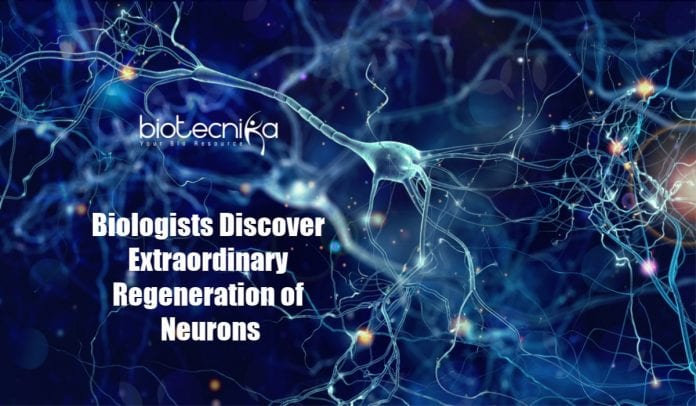Extraordinary Regeneration of Neurons Discovered
By Bayreuth University Biologists
In the central nervous system of zebrafish, a uniquely rapid form of regeneration in injured neurons and their function has been discovered by biologists from the University of Bayreuth. The Mauthner cells, previously regarded as incapable of regeneration and the ones solely responsible for the escape behavior of the fish were studied by the researchers. Their ability to regenerate, however, depends crucially on the injury’s location. Such a comprehensive regeneration of neurons has not been proven yet in the central nervous systems of other animal species. The journal Communications Biology published the findings.
In animal brains, the largest cells found are the mauthner cells. They trigger life-saving escape responses when predators approach and are part of the central nervous system of most fish and amphibian species. Only if a certain part of these cells, the axon, is intact, the transmission of signals in Mauthner cells to their motoneurons is guaranteed. The Mauthner cell dies if the axon’s injury occurs close to the body of the cell. Lost functions are either not restored at all or only to a limited extent and slowly if the axon is damaged at its opposite end. However, the Mauthner cell reacts with rapid and complete regeneration to an injury in the middle of the axon. The fish is able to escape approaching predators again as the axon and its function are fully restored within a week after the injury.

The first author of the new study and member of the Department of Animal Physiology, Dr. Alexander Hecker said, “Until now, such a rapid regeneration of a neuron in the central nervous system of other animal species was never observed anywhere. Usually, the process of regeneration extends over several weeks or months. The largely accepted view in the scientific community that Mauthner cells are not capable to regenerate is clearly disproved in this finding.”
However, it is also possible that this life-saving escape behavior and thus taking over the lost function of Mauthner cells could be induced by other neurons in zebrafish. But, in January 2020, Bayreuth biologists led by Prof. Dr. Stefan Schuster published their findings in PNAS which ruled out this possibility. No other cells are there in the fish that are capable of compensating for the loss if the axon is irreversibly destroyed.
Hecker said, “The possibility to investigate the very different responses to injuries of individual cells within the same nervous system is offered by the mauthner cells: robust and complete regeneration on one hand, and the absence of or insufficient regeneration processes on the other. The mechanisms that prevent the regeneration of neurons in humans could be better understood if the reasons why regeneration processes in Mauthner cells fail to occur can be found out.”
Source
Extraordinary Regeneration of Neurons Discovered By Bayreuth University Biologists






























